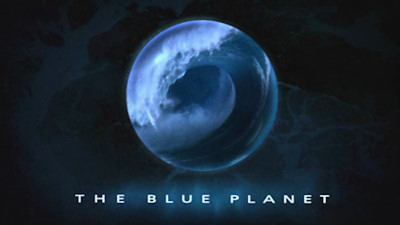
The Blue Planet
The Blue Planet is a British nature documentary series created and co-produced by the BBC and Discovery Channel. It premiered on 12 September 2001 in the United Kingdom. It is narrated by David Attenborough.
This article is about the BBC nature documentary. For other uses, see Blue Planet.The Blue Planet
The Blue Planet: Seas of Life
United Kingdom
English
8
50 minutes
12 September –
31 October 2001
Described as "the first ever comprehensive series on the natural history of the world's oceans",[1] each of the eight 50-minute episodes examines a different aspect of marine life. The underwater photography included creatures and behaviour that had previously never been filmed.[2]
The series won a number of Emmy and BAFTA TV awards for its music and cinematography.[3] The executive producer was Alastair Fothergill and the music was composed by George Fenton. Attenborough narrated this series before presenting the next in his 'Life' series of programmes, The Life of Mammals (2002), and the same production team created Planet Earth (2006).
A sequel series, Blue Planet II was aired on BBC One in 2017.
Background[edit]
The series took almost five years to make, involving nearly 200 filming locations. The fact that most of the ocean environment remains a mystery presented the production team with many challenges. Besides witnessing some animal behaviours for the first time, the crew also observed some that were new to science. The producers were helped by marine scientists all over the world with state-of-the-art equipment.
Blue whales – whose migration routes were previously unknown – were located by air, after some of the animals had been given temporary radio tags. The camera team spent three years on standby, using a microlight to land on the water nearby when they finally caught up with the creatures in the Gulf of California. The open ocean proved more difficult and over 400 days were spent in often unsuccessful filming trips. After six weeks, the crew chanced upon a school of spinner dolphins, which in turn led them to a shoal of tuna. Off Mexico, the behaviour of a flock of frigatebirds guided the cameramen to a group of sailfish and marlin: the fastest inhabitants of the sea. Near the coast of Natal in South Africa, the team spent two seasons attempting to film the annual sardine run, a huge congregation of predators such as sharks and dolphins, that assembles to feast on the migrating fish by corralling them into "bait balls". Meanwhile, in Monterey Bay, orca were documented attacking gray whales and killing a calf. Filming in the deep ocean required the use of special submersibles. One of them enabled the crew to dive over a mile into the San Diego trench, where the carcass of a 40-ton gray whale had been placed to attract a large variety of scavengers.[4]
When first transmitted on BBC One, over 12 million people watched the series and it regularly achieved an audience share of over 30%.
In 2018 a newly-discovered species of phytoplankton (Syracosphaera azureaplaneta) was named by scientists in honour of the programme, and in recognition of David Attenborough's contribution to promoting wider understanding and awareness of the oceanic environment.[5][6]
The Blue Planet was turned into a theatrical presentation entitled The Blue Planet Live! which toured the UK from 2006 to 2008. The UK live shows were presented by World Class Service Ltd. George Fenton conducted the Manchester Camerata Orchestra in Manchester, Newcastle and Nottingham during December 2006, in three critically acclaimed shows. The tour continued in April 2007, again conducted by Fenton, in London, Cardiff, Birmingham and returning to Manchester and Nottingham.
For the show, some of the most spectacular sequences from the series have been edited together and are displayed on a huge screen (18 metres wide and 3 storeys high). The presentation is introduced by a special guest.
The tour continued in April 2008 with dates at Wembley Arena, Nottingham Arena, Manchester Central, Cardiff St. David's and Birmingham Symphony Hall.[22]
The Blue Planet Live! continues to be staged:
Overseas[edit]
The series was sold to over 50 countries.[28] In the United States, it was shown as The Blue Planet: Seas of Life with the episodes in a different order, the first one being retitled "Ocean World". The series was shown on the Discovery Channel and was narrated by Pierce Brosnan.
Criticism[edit]
The series attracted some criticism when it was revealed that some of the footage was filmed at an aquarium in Wales. The series producer, Alastair Fothergill, said that around 2% of the whole series was filmed in tanks at aquariums.[35][36] A BBC spokesman argued that it would've been unethical to actually disturb the breeding process of wild lobsters for one of the scenes, which was why they made the decision to use the aquarium footage.[35]